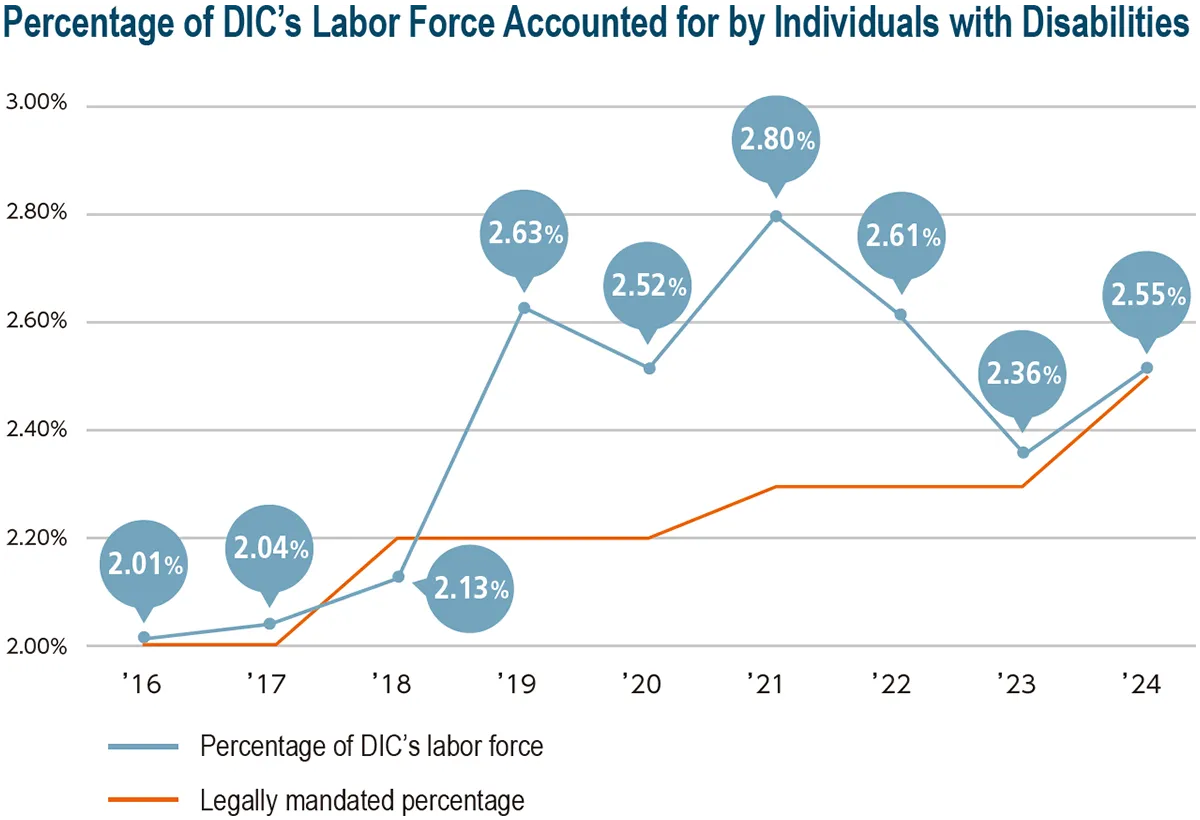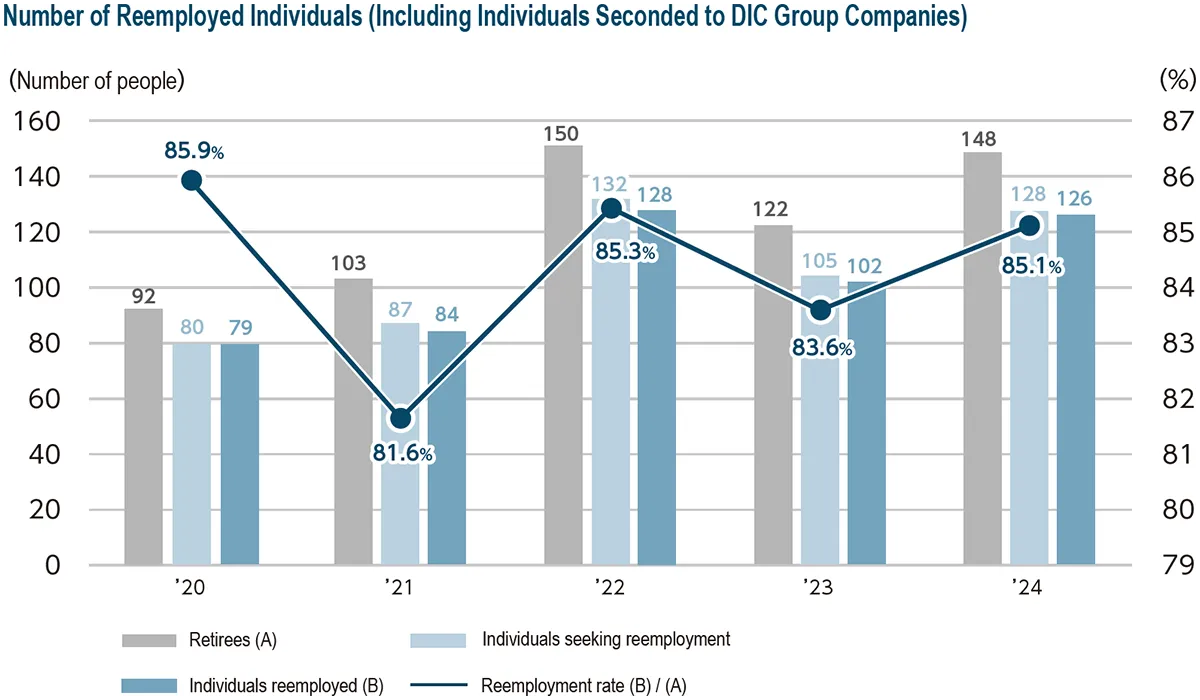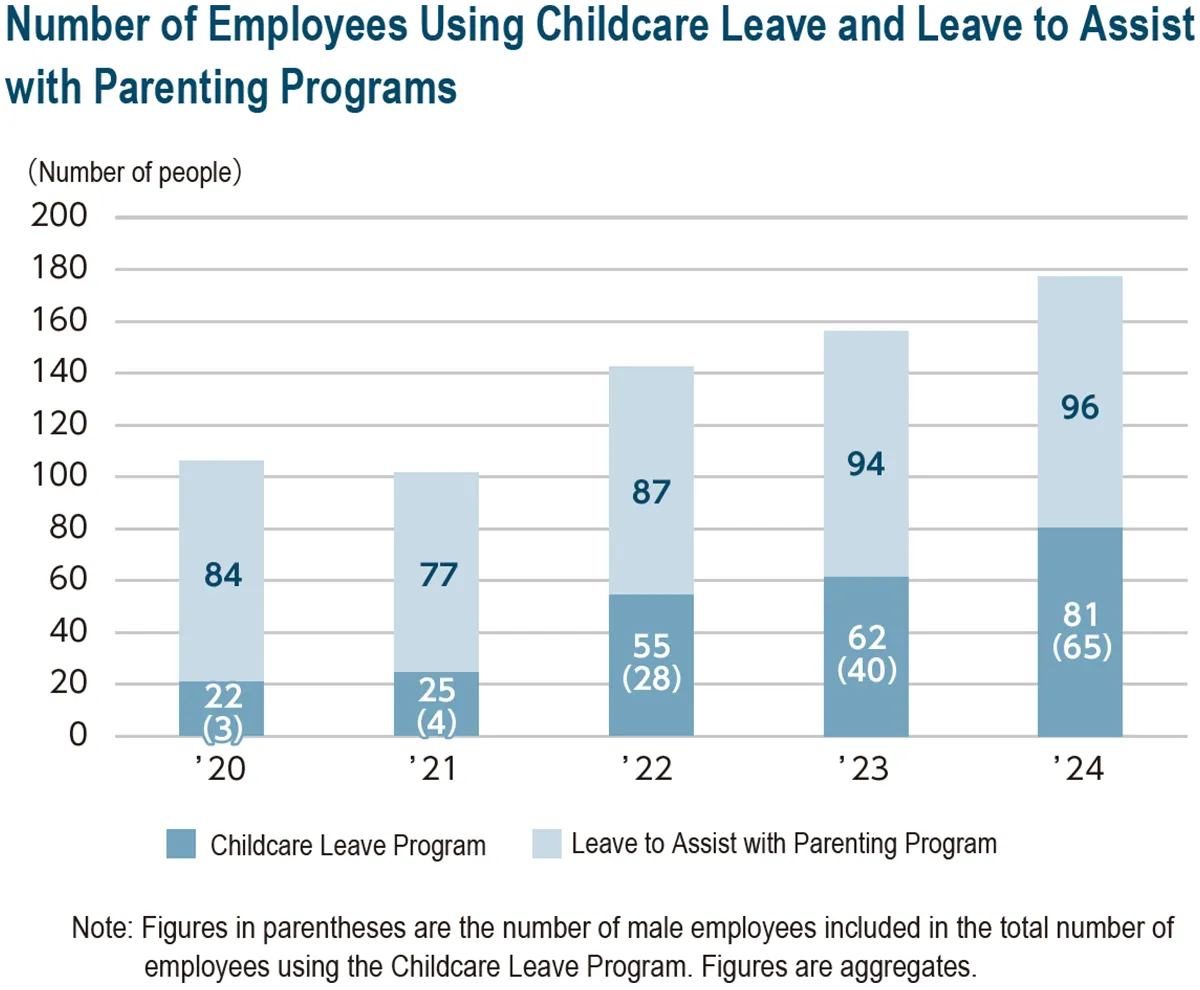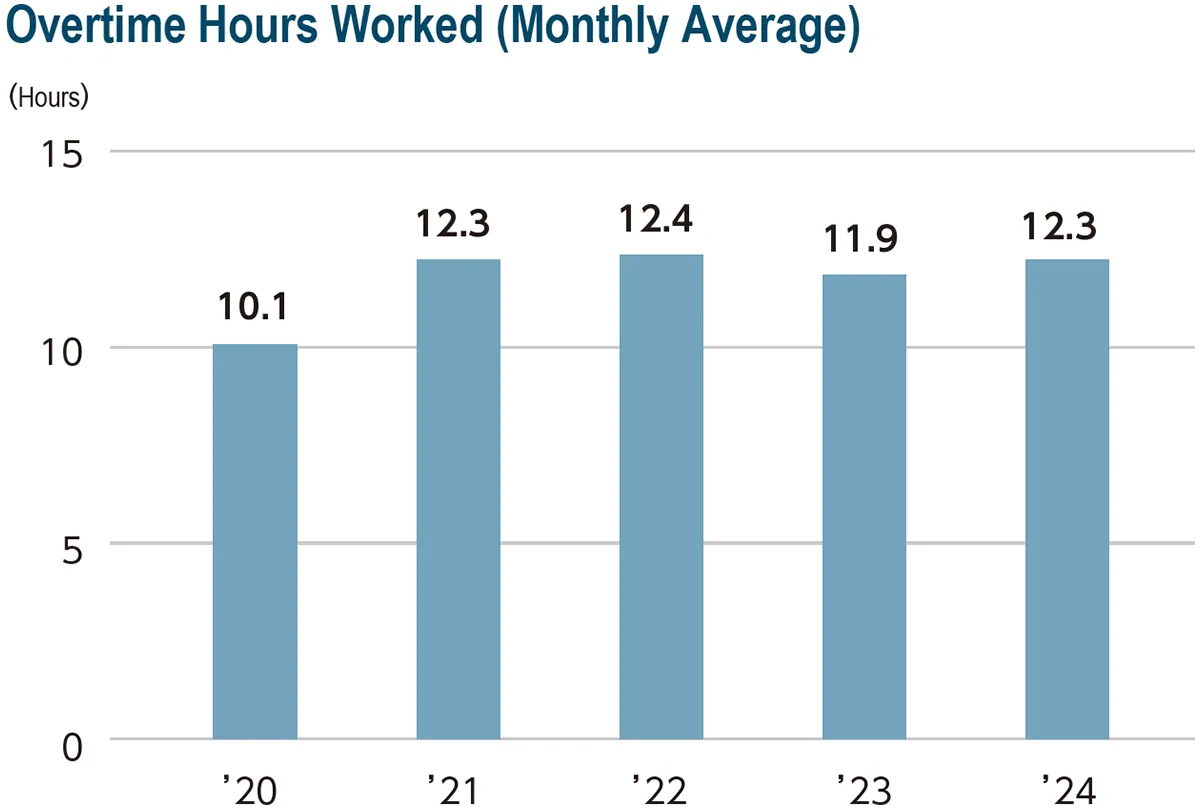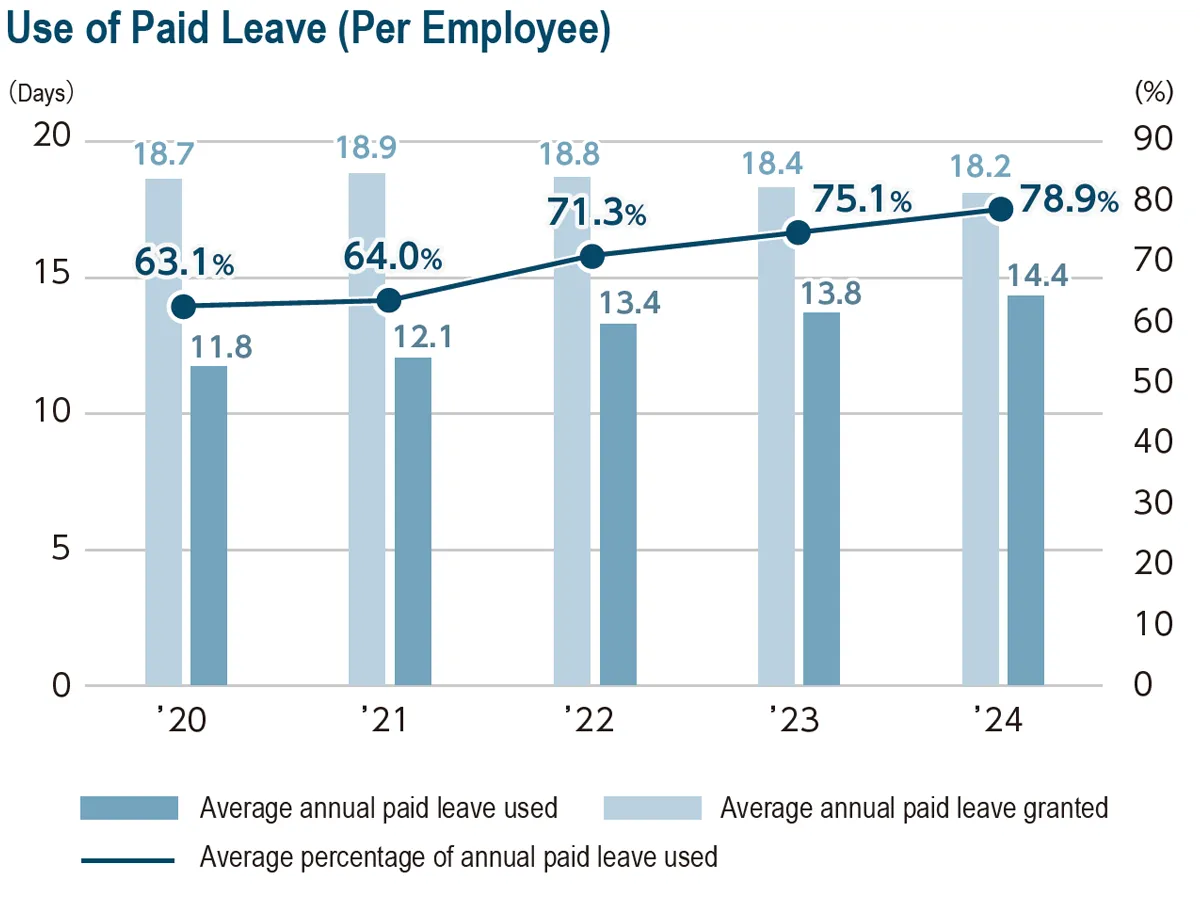With Employees
- Goals and Achievements of Major Initiatives
- 1. Reinforce Management of Human Capital
- 2. Three Strategic Priorities
- 3. Talent Management: Personnel System, Global Human Resources Framework and Group Human Resources Governance
- 4. DIC’s Approach to Diversity
- 5. Respect for Human Rights
- 6. Work–Life Balance/Occupational Health
- Ties with Employees
- Ties with the Media
Goals and Achievements of Major Initiatives
Foster human resources.
| fiscal year | Goals | Achievements | Evaluation |
|---|---|---|---|
| 2024 | Systematically foster Group management candidates and future global leaders. (DIC Group) | The DIC Group’s first training program for global leadership candidates was launched. Three employees from overseas participated. Plans are to continue holding multiple sessions through fiscal year 2025. (DIC Group) | ★★ |
| Promote reskilling and the improvement of management capabilities (promote DX training and basic skill improvement, and enhance people management capabilities). (DIC and DIC Graphics) | DX training, including a program aimed at fostering data scientists, was implemented in collaboration with business groups/units. Additionally, workshops designed to improve the management skills of managementlevel employees were held using a smallgroup format, with a total of 500 employees participating. (DIC and DIC Graphics) | ★★ | |
| 2025 | Systematically foster Group management candidates and future global leaders. (DIC Group) | ― | ― |
| Promote reskilling and the improvement of management capabilities (promote DX training and basic skill improvement, and enhance people management capabilities). (DIC and DIC Graphics) | ― | ― |
Ensure mobility (hiring, retention and succession).
| fiscal year | Goals | Achievements | Evaluation |
|---|---|---|---|
| 2024 | Enhance the “Job Challenge” and “Job Challenge +” systems. (DIC) | The “Job Challenge” program (internal recruitment system) was not implemented. The “Job Challenge +” (internal “side job” system) was implemented as planned, with a total of 10 employees taking advantage of the system over the course of the year. (DIC) | ★ |
| Promote department-specific human resources portfolio planning. (DIC Group) | For key positions in each business unit (approximately 100 mainly second- and thirdtier positions in total), “To Be” requirements formulated with a view to fiscal year 2030. (DIC) | ★★ | |
| Implement strategic mid-career hiring. (DIC) | Mid-career hires accounted for 51.2% of new recruits. Recruitment targets were achieved for global human resources with advanced expertise and skills, including legal and international tax professionals. (DIC) | ★★ | |
| 2025 | Enhance the “Job Challenge” and “Job Challenge +” systems. (DIC) | ― | ― |
| Promote department-specific human resources portfolio planning. (DIC Group) | ― | ― | |
| Implement strategic mid-career hiring. (DIC) | ― | ― |
Improve engagement and organizational cohesiveness.
| fiscal year | Goals | Achievements | Evaluation |
|---|---|---|---|
| 2024 | Encourage one-on-one meetings to enhance internal communications, team building and people management capabilities. (DIC and DIC Graphics) | Steps were taken to revitalize one-on-one meetings, including tying them to Career Design Month and providing feedback on the status of implementation to individual departments. (DIC and DIC Graphics) | ★★ |
| CliftonStrengths® (formerly StrengthsFinder) was used as a part of team building in all but one department, for which implementation is scheduled for fiscal year 2025. (DIC and DIC Graphics) | ★★ | ||
| Advance career support measures to assist the efforts of employees to design their own careers. (DIC Group in Japan) | Follow-up interviews were conducted with all participants in age group–specific career training. Career Design Month, which features a message from DIC’s president and CEO and expert-led seminars, was held to encourage employees to contemplate their own careers. (DIC and DIC Group in Japan) | ★★ | |
| 2025 | Encourage one-on-one meetings to enhance internal communications. (DIC) | ― | ― |
| Promote the enhancement of team building. (DIC) | ― | ― | |
| Advance career support measures to assist the efforts of employees to design their own careers. (DIC Group in Japan) | ― | ― |
Reinforce human resources system/governance.
| fiscal year | Goals | Achievements | Evaluation |
|---|---|---|---|
| 2024 | Continue to consider the introduction of a global human resources information system. (DIC Group in Japan) | Multiple discussions were held to discuss, among others, the scope of and steps required for future deployment. (DIC and DIC Group in Japan) | ★★ |
| Build a management system for human resources–related KPIs. (DIC Group) | In addition to responding to expanded disclosure requirements, including for annual securities reports, quarterly human resources reports were launched to improve the accuracy of human resources–related KPI data. (DIC Group) | ★ | |
| 2025 | Continue to consider the introduction of a global human resources information system. (DIC Group in Japan) | ― | ― |
| Determine human resources–related KPIs and enhance the visibility of progress. (DIC Group) | ― | ― |
Promote diversity.
| fiscal year | Goals | Achievements | Evaluation |
|---|---|---|---|
| 2024 | Continue to implement measures to promote diversity (training for female employees in leadership roles, career support for employees who are foreign nationals, job opportunities for individuals with disabilities). (DIC Group in Japan) | The following were planned and implemented duly as part of leadership training for female employees: mentoring systems, a system for dispatching such employees for external training, and in-house training for regular employees. As part of its effort to provide career support for employees who are foreign nationals, networking conferences were held to foster ties among non-Japanese employees. (DIC Group in Japan) |
★★ |
| The percentage of the total labor force accounted for by individuals with disabilities was 2.55%, up from 2.36% in the previous fiscal year. This was attributable to collaboration between the person at DIC responsible for promoting the hiring of individuals with disabilities and special-purpose subsidiary DIC Estate to promote the hiring of such individuals and strengthen related management and guidance systems. (DIC) | ★★ | ||
| 2025 | Continue to implement measures to promote diversity. (DIC) | ― | ― |
| ― | ― |
Guarantee human rights.
| fiscal year | Goals | Achievements | Evaluation |
|---|---|---|---|
| 2024 | Conduct human rights due diligence in line with updates to the DIC Group Human Rights Policy. | Human rights due diligence was conducted in conjunction with voluntary self-inspections for compliance with labor laws. (DIC Group in Japan) |
★★ |
| 2025 | Conduct human rights due diligence. (DIC Group) | ― | ― |
Support a healthy work–life balance.
| fiscal year | Goals | Achievements | Evaluation |
|---|---|---|---|
| 2024 | Continue to implement corporate health management measures. | The same corporate health management measures were implemented as in fiscal year 2023, although the focus was on antismoking measures. Steps taken included phasing out dedicated smoking areas at all sites, including corporate headquarters and branch offices, and encouraging employees to give up smoking with the goal of preventing related damage to their own health and protecting colleagues and others from secondhand smoke exposure. (DIC) | ★★ |
| 2025 | Continue to implement corporate health management measures. (DIC) | ― | ― |
- Evaluations are based on self-evaluations of current progress.
Key: ★★★ = Excellent; ★★ = Satisfactory; ★ = Still needs work
Basic Approach to Human Resources Management
To ensure its vision statement, “We improve the human condition by safely delivering color and comfort for sustainable prosperity—Color & Comfort,” permeates the work of all employees, the DIC Group aims to be a highly engaged organization in which a broad spectrum of individuals work together with a sense of unity to amplify social value. Recognizing human resources as capital critical to the execution of strategies, the Group is committed to respecting human rights and guaranteeing the safety of all employees, as well as to creating work environments that empower its diverse employees to fully realize their potential, and strives to create systems and an infrastructure that support autonomous growth. The Group also strives to foster human resources who can play an active global role and contribute to greater organizational cohesiveness.
1. Reinforcing Management of Human Capital
① Building a Strategic Human Resources Portfolio that Maximizes the Value of Human Capital
The DIC Group has set forth a basic strategy for human resources of reinforcing its management of human capital, recognizing human resources as capital that is crucial to the execution of management strategies. The Group believes that bringing together diverse human resources and maximizing their capabilities is the source of its competitiveness. As such, the Group is promoting the swift implementation of measures in line with three strategic priorities, which are to foster human resources, ensure mobility (hiring, retention and succession), and improve engagement and organizational cohesiveness, seeing these as essential to building an ideal human resources portfolio that will ensure the Group achieves the goals of DIC Vision 2030. The Group is also working to build a new personnel management platform by advancing initiatives to reinforce its human capital from the perspectives of framework creation, risk management and corporate culture/work style reform.
DIC Vision 2030: Three Strategic Priorities and a Personnel Management Platform
| Three strategic priorities | ||
|---|---|---|
Foster human resources
|
Ensure mobility (hiring, retention and succession)
|
Improve engagement and organizational cohesiveness
|

| Personnel management platform | |
|---|---|
Framework creation: Global HR system
|
Risk management: Safety and compliance
|
Corporate culture: Value diversity and inclusion
|
|
② WSR 2020
WSR 2020, launched in fiscal year 2020, is an executive-led committee in which all employees participate. The aim of this committee is to ensure job satisfaction and productivity with the goal of strengthening the win–win relationship between DIC and employees. Beginning in fiscal year 2024, efforts focus on improving and enhancing employee engagement.
③ Basic Personnel Statistics (DIC)
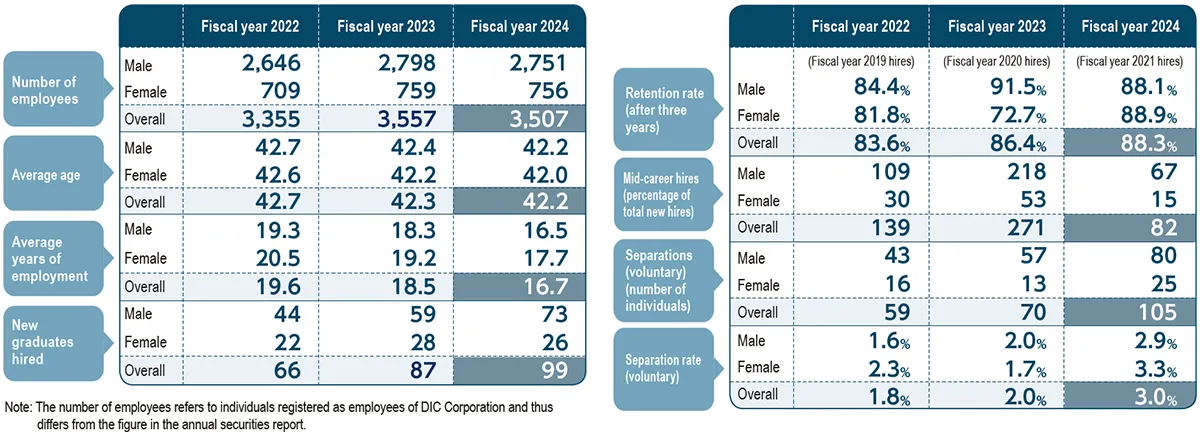
2. Three Strategic Priorities
The DIC Group’s basic strategy for human resources and diversity is to reinforce its management of human capital. This reflects the Group’s belief that maximizing the value of human capital is crucial to achieving business transformation and establishing a more robust global management configuration. Guided by this basic strategy, the Group is promoting measures in line with three strategic priorities, which are to foster human resources, ensure mobility (hiring, retention and succession), and improve engagement and organizational cohesiveness.
1. Foster Human Resources
① Global-Based Talent Management
As part of its plan to nurture the next generation of senior leaders who will steer its global businesses in the years ahead, the DIC Group established a new program called Global Management Accelerator (GMA) to select candidates for global executive management positions. In fiscal year 2024, the program’s first year, participants were selected from Group companies around the world to undergo group training at DIC’s corporate headquarters in Japan. In fiscal year 2025, the Group plans to dispatch participants to overseas Group companies for joint training, as well as to attend shortterm programs at renowned institutes of higher education. It is hoped that this training prepares participants to exercise their capabilities and grow as individuals with the competence to take on important positions.
② Leadership Training
In Japan, DIC chooses talented employees with the goal of systematically cultivating the leaders of the future and dispatches them to a variety of external institutions providing a diverse range of training or to participate in group training. In addition, to expand the scope of efforts to foster leaders across the DIC Group, the Company is collaborating with regional headquarters to explore the creation of a leadership training program that is aligned with its talent pooling process.
In the Asia–Pacific region, the DIC Group’s leadership training program uses a comprehensive curriculum that provides selected key managers with essential skills, with modules on design thinking, mental wellness, coaching, mentoring, innovative thinking, resilience and cultivating effective leadership skills. In the PRC, the Group has provided the Leadership Development Program for mid-level and senior managers since fiscal year 2013. This program, which is offered once annually, gives participants the opportunity to learn about current economic and financial topics, visit well-known companies and share experience accumulated in-house, helping to foster general managers and identify potential successors.
Sun Chemical also invests in leadership training, believing that capable management-level employees are critical to growth and to creating a performance–centered corporate culture. Inaugurated in fiscal year 2022, the company’s leadership training program initially focused on frontline employees but has since been expanded to managers at different levels and in multiple countries, with more than 150 individuals having completed training to date.
③ Career Development Opportunities and Skills Training
DIC promotes autonomous reskilling and skill improvement for employees in Japan promptly after hiring to encourage career development and skills training. In fiscal year 2024, the Company defined the portable skills required of all DIC employees and added an elective online program to its rank-specific training. DIC and DIC Graphics also held small-group people management skills improvement workshops for management-level employees in which a total of 500-plus individuals participated.
In the Asia–Pacific region, the DIC Group continues to invest in employee growth through a variety of career development and educational initiatives. Core offerings including leadership training for managers, practical training and technical skill enhancement programs. The Company has also expanded its e-learning platform and reinforced language courses to support continuous learning and prepare employees to confront challenges in an evolving business environment. In the PRC, the Group provides explicit career path guidance and seeks to motivate employees to acquire skills and leadership capabilities. In addition to general onthe- job skills training, the Company dispatches certain individuals for training at external institutions. Local Group skills competitions are organized to encourage continuous learning and self-improvement. The Company also deploys an e-learning platform, matching employees and courses and conducting tests to gauge participants’ grasp of salient information.
In addition to leadership training, Sun Chemical's key focus areas include compliance, sales, safety training, and cybersecurity. Most learning is experiential and occurs on the job. Regular conversations between managers and employees help identify development areas, creating a continuous feedback loop. Managers are trained to better support their employees through regular training and best practice sharing sessions, known as the Sun Leaders Community.
Average Spending on Education and Training per Employee (DIC)
| Region | Average time spent on education/training (hours/empcloyee) |
|---|---|
| Japan (DIC) | 9.1 |
| PRC | Up to 13 |
| Asia–Pacific region | 19.5 |
2. Ensure Mobility (Hiring, Retention and Succession)
DIC recognizes that the realization of business portfolio transformation depends on not only fostering human resources but also on ensuring and improving mobility for DIC Group employees.
① Capitalizing on Experienced Mid-Career Hires
In addition to recruiting the global talent necessary to sustain its management system, DIC is stepping up efforts to recruit experienced individuals with advanced expertise and skills, including attorneys and international tax specialists. With the goal of securing and maintaining its competitiveness in recruiting and of attracting talented individuals with diverse skills and careers, in fiscal year 2024 the Company diversified recruitment channels for such candidates by strengthening general referral and alumni referral recruitment. Thanks to these and other efforts, the percentage of new recruits that were mid-career hires in fiscal year 2024 was 51.2%.
② Support for Autonomous Career Building
DIC supports autonomous career building by its employees and has a system in place whereby in-house career consultants are available to offer counseling to employees when needed. The Company also follows up age group–specific career training by conducting interviews with all participants to support them in formulating a clear career vision and promoting autonomous career building. In fiscal year 2024, the Company began holding Career Design Month, an event that includes a message from DIC’s president and CEO and seminars conducted by experts and seeks to provide employees with the opportunity to carefully consider their careers.
To support employees in forging the career they desire, DIC has established an in-house recruitment system dubbed “Job Challenge.” The Company also offers “Job Challenge +,” which enables employees to temporarily take on a job in another department while continuing to serve in their current capacity. During fiscal year 2024, 10 individuals took advantage of the latter program.
In the PRC, a dual career path enables DIC Group employees to progress toward a managerial role (from supervisor to department head) or a professional role that requires experience and specialized skills. Employees are able to move between the two tracks, career development policies are communicated fully and training is provided, ensuring that all employees understand how to advance their own careers.
At Sun Chemical, we are dedicated to fostering employee growth. In 2024, we launched Sun Careers, a framework to enhance transparency across our global businesses and functions, clarify career paths, and promote internal mobility. Sun Careers emphasizes fairness and equity, rewarding employees based on their skills, responsibilities, and performance. All recruitment activities are posted internally, allowing employees to view and apply for positions outside their departments. Managers are encouraged to have regular career discussions with employees to identify development opportunities and support career progression.
③ Promotion of Succession Planning
DIC promotes succession planning from the perspective of ensuring business continuity and enhancing the visibility of human resources. In fiscal year 2024, the Company designed the “To Be” portfolio, consisting of approximately 100 key positions, with a view to building a team of superior human resources. With the assumption that these positions will continue to exist through fiscal year 2030, the Company anticipates how the requirements of these positions will evolve and identifies the skills and career experience needed in the individuals filling these positions (the future, or “To Be,” ideal). In consultation with individual divisions and business units, DIC has developed related plans for approximately 200 key positions at DIC and at Group companies in Japan and the Asia– Pacific region. The Company will provide support to ensure that these plans are implemented successfully and promote transfers, training and other measures to help foster candidates by closing any gaps found to exist between current and “To Be” requisite career experience and skills.
In the Asia–Pacific region, the DIC Group seeks to facilitate effective succession by undertaking thorough skills gap analyses to be certain that attention is focused on cultivating capabilities in areas where this is considered particularly crucial.
3. Improve Engagement and Organizational Cohesiveness
In Japan, DIC promotes a variety of initiatives, spearheaded by the WSR 2020 Committee, to improve engagement and organizational cohesiveness, with the ultimate goal of strengthening the win–win relationship between the Company and employees.
① Surveys to Assess Engagement
As a WSR 2020 initiative aimed at improving engagement, since fiscal year 2021 DIC periodically surveys employees of DIC Group companies in Japan regarding this topic. The average score for key survey questions is the principal KPI for employee engagement. In fiscal year 2024, the average survey score was 3.20.
Employee engagement surveys have been conducted in the PRC since fiscal year 2019. Survey results have enabled local DIC Group companies to identify issues and implement action plans aimed at improving employee engagement by, among others, reinforcing communication with employees, heeding their suggestions, establishing new processes and amending internal rules. Thanks to such efforts, the percentage of survey participants who responded that they feel engaged in their work has risen steadily from 53.5% in fiscal year 2019, reaching 68.9% in fiscal year 2024.
② Cultivation of Solidarity through Communication, Empathy and Trust
DIC and DIC Graphics have introduced a system of one-on-one meetings with the goal of promoting communications between superiors and subordinates as a measure to improve engagement. Feedback is provided to departments on the meeting status and issues raised by employees. The two companies are also working to further energize these one-on-one meetings by implementing related projects in conjunction with the aforementioned Career Design Month.
In a distinctively DIC initiative, the Company also promotes initiatives that leverage CliftonStrengths®, a tool that assesses individual strengths and encourages appreciation for diversity. To date, this tool has helped many employees gain a deeper understanding of their own unique talents. In fiscal year 2023, the Company launched a team-building initiative aimed at fostering collaboration by nurturing mutual recognition of differences in perspective and approach. This initiative continued through fiscal year 2024 and is scheduled to conclude in fiscal year 2025. Looking forward, DIC will continue to build inclusive environments that value the particular capabilities of its people and enable all employees to leverage those capabilities.
3. Talent Management: Personnel System, Global Human Resources Framework and Group Human Resources Governance
As it works toward achieving the goals of DIC Vision 2030, DIC is taking steps to enhance its organizational capabilities to support qualitative reforms in existing core businesses and the successful commercialization of new businesses. To this end, the Company has set forth several key priorities, including improving the added value generated by, and the productivity of, all employees, encouraging a greater performance- and challenge-oriented focus, and supporting career building, and has dramatically revamped its qualifi cation-based remuneration and evaluation systems. At the same time, given the rapid expansion of the DIC Group’s global operations, the Company is promoting the creation of a standardized global human resources framework and strengthening its human resources governance to facilitate the integration of Group human resources management, as well as to further fortify its management foundation over the medium to long term and improve management transparency.
1. Qualifi cation-Based Remuneration System: Encouraging Autonomous Career Building and Maximizing Performance
● Job- and Performance-Oriented Qualifi cation-Based Remuneration System
To ensure employees clearly understand DIC’s mission and are able to fully realize their potential, the Company has defi ned rank- and jobspecifi c roles, necessary abilities and performance expectations for all employees. This system also outlines the roles and abilities expected of higher-ranking employees to help individual employees to map out their own career prospects.
● Promotion of Multitrack Career Building
DIC has established systems for fostering both generalists and specialists to facilitate multitrack career building. As well, the Company created a scheme that divides management-level employees, depending on their particular role/job, into either people managers or professionals, facilitating promotion in accordance with individual strengths and aptitudes.
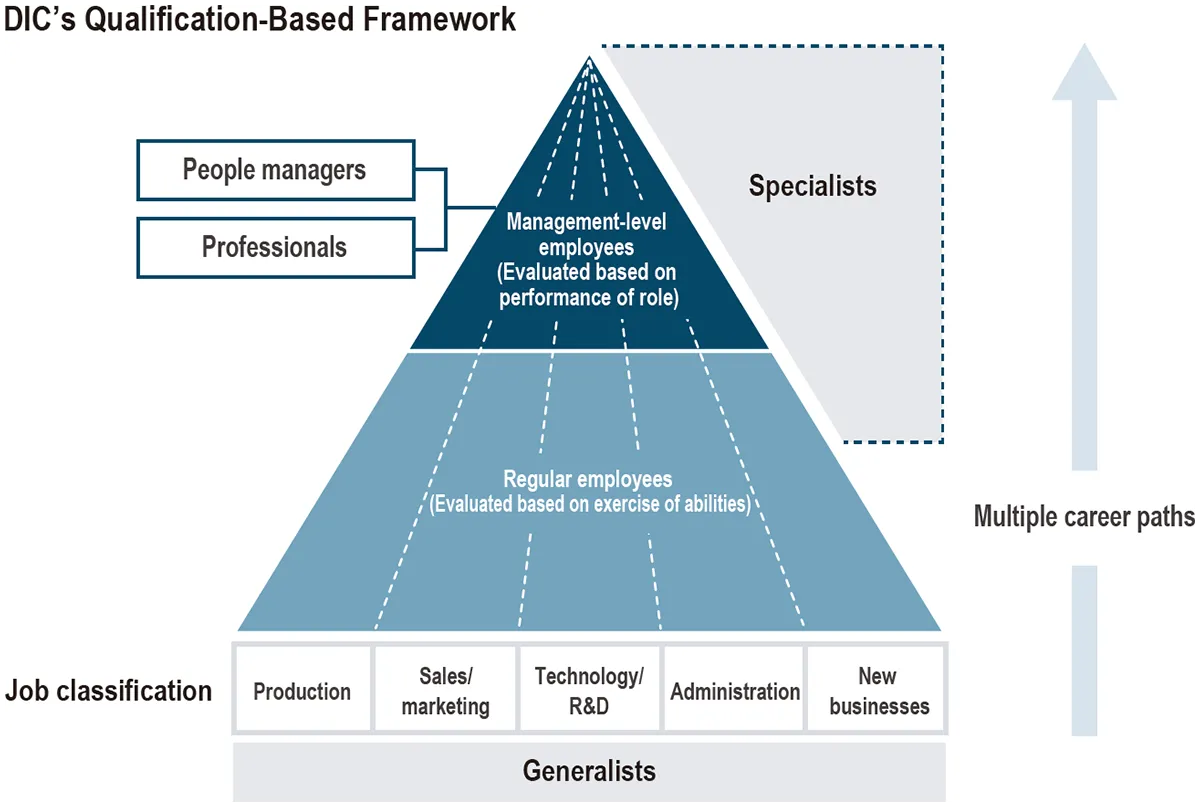
2. Evaluation Systems that Inspire Employees to Achieve Results and Take on Challenges
● Performance-Based Evaluations
To further advance its emphasis on performance and encourage employees to take on challenges, DIC has set targets and prepared evaluation sheets, creating a system to facilitate a more quantitative assessment of performance, and reviewed conduct and process assessment procedures to foster autonomous action. This will make it possible to evaluate the cumulative achievements of employees who have acted autonomously to address complex challenges in a manner that contributes to the achievement of the targets of the DIC Vision 2030 long-term management plan.
Seeking to inspire employees to take on challenges in addition to their existing responsibilities, DIC has also created a mechanism whereby points are added to the evaluation of employees who have taken bold steps that have not only yielded short-term results but also contributed to medium- to long-term growth, thereby further motivating them to seek challenges and drive innovation.
Sun Chemical has adopted a standardized evaluation process designed to engender a performance-centered corporate culture. This process has clear, measurable goals, and includes ongoing coaching and feedback between managers and employees, as well as a calibration procedure to ensure that evaluations are consistent across departments and positions. State-of-theart human resources IT systems are deployed to bolster consistency and accountability. This evaluation process ensures that employees have clear goals, and that fiscal year-end reviews and career development discussions are conducted. Sun Chemical employee participation in this process was 60% in fiscal year 2024, and the company has set a target of 75% by fiscal year 2025.
● Personnel Evaluation System as a Tool for Career Building
DIC has adopted a career goal sheet for employees to plan and track their own career development. Using these sheets allows individuals to take stock of their own careers at present and envision where they want to be in the future. Employees write in their own goals, to which their superiors will add comments, and the sheets are incorporated into one-on-one meetings to assist employees’ autonomous efforts to build fulfi lling careers.
3. Creation of a Standardized Global Human Resources Framework
With the rapid expansion of its global operations, DIC recognizes the fact that comprehensive human resources management that helps it to secure and foster human resources around the world and to ensure the right people are in the right places across the DIC Group is essential to bolstering the value of the Group’s human capital and effectively carrying out its management strategies. The Company is thus promoting the adoption of a common personnel system and shared management strategies for the global DIC Group. In January 2018, DIC and DIC Graphics replaced their traditional ability-based qualification standards for management-level employees with role-based standards, which are common worldwide. As a consequence, uniform duty- and role-based standards are now used for the majority of such employees at DIC Group companies in Japan, the Americas and Europe, the PRC and the Asia–Pacific region.
Sun Chemical has implemented SAP SuccessFactors for our performance and development processes to drive consistency and accountability.
With the growth of ESG investment, companies are also increasingly expected to provide accurate disclosure regarding human capital as a key component of the nonfinancial information investors demand. This further underscores the importance of centralizing the management of human resources information within the Group. Looking ahead, DIC will continue formulating and disseminating related Group KPIs, as well as working to achieve the goals it has set.
4. Group Human Resources Governance
With the objective of further fortifying its management foundation over the medium to long term and improving management transparency, the DIC Group is reinforcing its human resources governance as it pertains to individuals in principal positions, including the CEOs of regional headquarters, Group company presidents and heads of regional functional departments. In particular, the committee responsible for evaluating the performance of and determining remuneration for individuals in principal positions in the Americas and Europe, the PRC and the Asia– Pacific region meets annually, ensuring that individual employee goals align with Group management strategies. Pertinent management members from corporate headquarters also participate in evaluations. Remuneration is reviewed annually after verifi cation of prevailing market trends.
In addition, the DIC Group has introduced Group succession guidelines in the PRC and the Asia–Pacific region. Succession plans for individuals in principal positions are formulated and implemented by DIC in collaboration with regional headquarters and Group companies to ensure the appropriate organizational regeneration.
4. DIC’s Approach to Diversity
1. Advancing Efforts to Realize DEI&B
Viewing diversity, equity, inclusion and belonging (DEI&B) as intertwined concepts, DIC is committed to creating workplaces that respect the individuality of each and every employee (diversity), providing equal opportunities and prospects to all employees demonstrating enthusiasm (equity) and enabling all employees to exercise their capabilities and play an active role (inclusion). The Company believes that achieving these three goals will help employees feel a sense of being accepted and valued (belonging).
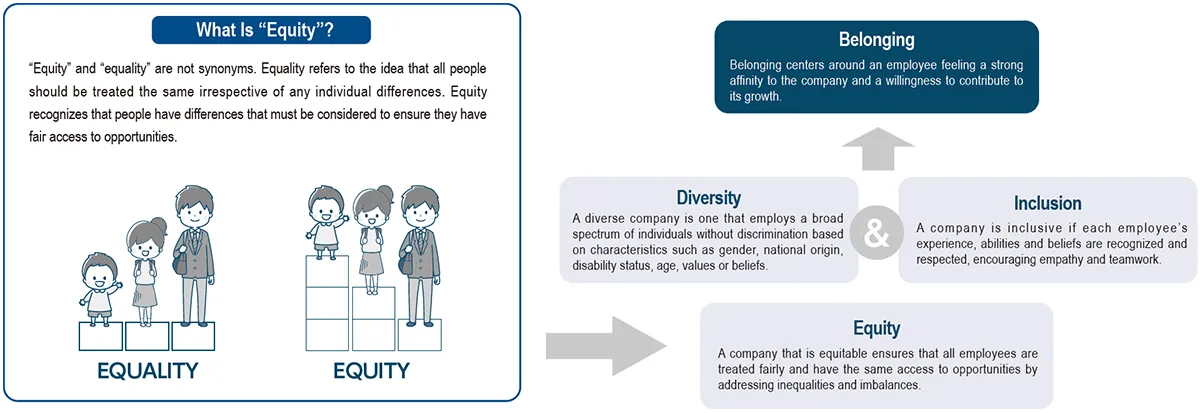
The DIC Group believes firmly that the added value created by diverse human resources amplifies social value and that this, in turn, leads to long-term improvements in its corporate value. The diverse individuals comprising the Group’s labor force come from various backgrounds and bring with them a wide range of individual capabilities and skills. It is these “differences” that will drive innovation going forward, enabling the DIC Group to live up to its vision, “We improve the human condition by safely delivering color and comfort for sustainable prosperity—Color & Comfort.”
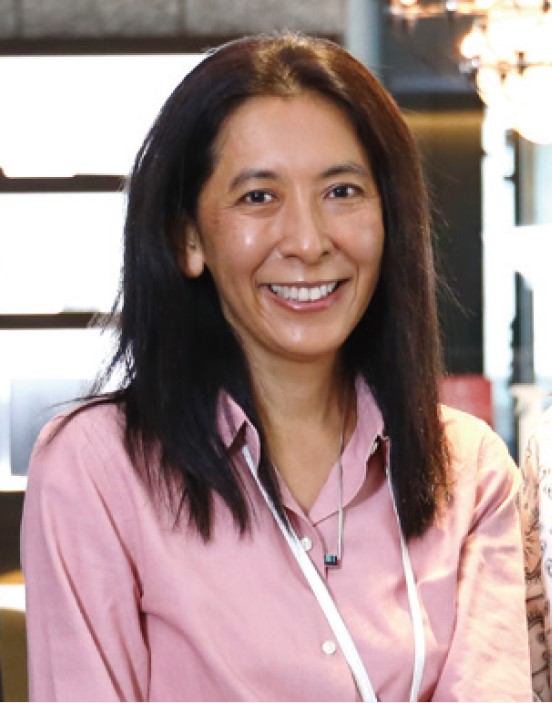
Kuniko Torayama
Head of ESG Unit, In Charge of Diversity, DIC Corporation
Diversity Across the DIC Group
The DIC Group is a global organization that as of December 31, 2024, consisted of 171 companies in 62 countries and territories and had a global labor force of 21,184, with more than 70% in other countries and territories. Diversity within the Group has come to exist across multiple variables besides gender, including cultural background, race, religion and ideology. The diverse perspectives and experiences of our employees is a key source of growth and innovation. We believe that it is important to respect and acknowledge these differences to build an environment in which all employees can feel at ease and empowered to reach their full potential.
At the same time, because the challenges faced vary depending on location we continue to prioritize those that are the most pressing in each country and territory. DIC’s global presence enables us to pool experiences and expertise across regions. Specifically, global DEI&B managers regularly exchange ideas and share both best practices and failures, with the aim of improving diversity initiatives Groupwide. In fiscal year 2025, for example, we will expand implementation of a mentoring program currently offered in Japan to the Asia–Pacific region with the aim of reinforcing career support. We are making progress in our push to build a “One DIC” approach and I strongly believe that our efforts are helping the Group realize true diversity, equity and inclusion and to create work environments where all employees can thrive and feel a sense of belonging.
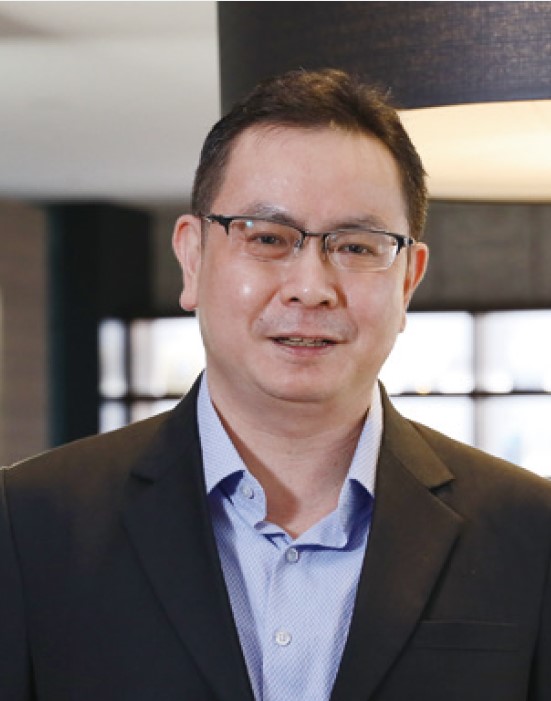
Clifton Tang
Regional Human Resource Director, DIC Asia Pacific Pte Ltd.
Asia–Pacific Region
The DIC Group in the Asia–Pacific region comprises 21 companies, spanning 12 countries and territories, with approximately 3,000 employees. We work proactively to advance diversity with a global perspective. We have taken decisive steps to prevent discrimination on the basis of gender, race or other irrelevant factors in recruitment, and to ensure all candidates are evaluated impartially on the basis of their qualifications and the requirements of the job for which they are applying. A commitment to fair hiring has become firmly rooted in our corporate culture, as a result of which 29% of management positions are currently filled by women, many of whom were trained by the DIC Group in the Asia–Pacific region. This is a significant improvement from 20% in 2020 and represents important progress for the region. We have also seen a steady increase in the number of women in corporate leadership roles, as well as in regional leadership positions.
We are working to strengthen regional health management programs, reviewing internal healthcare systems and providing regular physicals with the aim of identifying issues early, and to promote awareness of the need to maintain good health. In addition, we have stepped up efforts to promote diversity in our efforts to foster successors for key positions and have begun conducting full-scale competency analyses and evaluations with the aim of building a diverse and robust human resources portfolio that ensures we are prepared for our next stage of growth. We have also inaugurated training programs designed to foster individual capabilities with the goal of creating an environment in which all employees can grow and achieve success.
In line with DIC’s long-term vision, we will continue to drive DEI&B by strengthening employee engagement and conducting engagement surveys. This will better enable us to respond to the needs of individual employees and at the same time to eliminate bias, both conscious and unconscious, accelerating our transformation into an ever-more diverse organization where superior human resources can thrive.
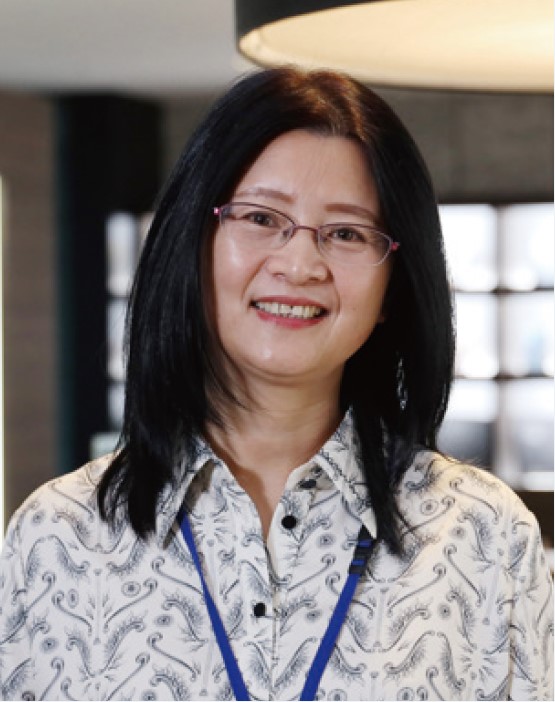
Genni Zhou
Corporate HR Director, DIC (China) Co., Ltd.
Greater China
Greater China is home to 24 DIC Group companies. In the PRC, dual-income households are common and there are many women in managerial positions, meaning that there are few discernable differences in the gender breakdown at the management level. Against this backdrop, we are conducting employee surveys across the region and implementing various measures tailored to the stage of each employee’s career and the nature of their job. Specifically, we have formulated career development guidelines and are strengthening career support with the goal of enabling employees to proactively select their own growth opportunities. We also conduct one-on-one meetings to provide individual career counseling and support to employees in the 31–35 age bracket, who are likely to experience a decline in engagement, as well as to new employees within their first three months on the job, and employees who have been with their employer for between five and 10 years. In addition, we provide training and conduct workshops for frontline employees, including operators and production floor staff, to encourage greater autonomy and create more supportive work environments. We are also reinforcing training programs and employee support services customized to reflect the characteristics of and challenges faced by individual departments to help employees bolster their skills and grow professionally. Thanks to such efforts, we have seen steady improvements in awareness of the DIC corporate vision, trust in the Company, work–life balance, communication, collaborative spirit and other key indicators. Looking ahead, we will continue striving to create work environments that make all employees feel empowered to maximize their capabilities and highly engaged in their work.
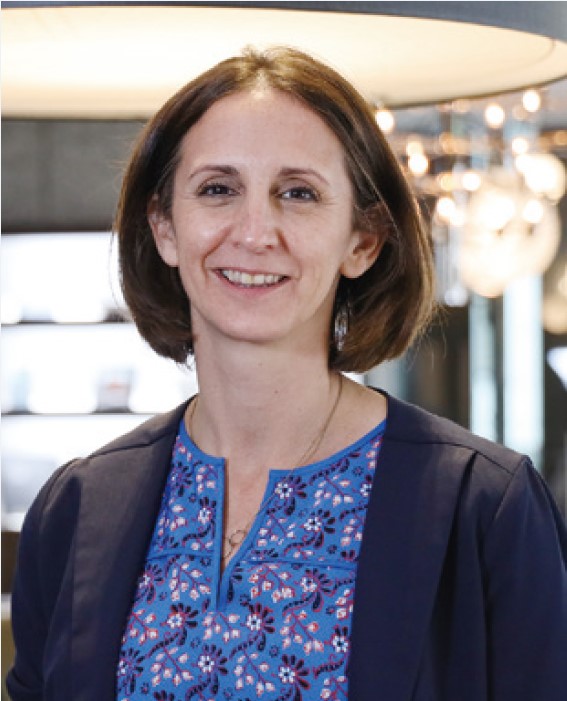
Jennifer Dewey
Director, Global Talent Management, Sun Chemical Corporation
The Americas, Europe, the Middle East and Africa
Sun Chemical proudly boasts a global workforce of over 10,000 employees across 45 countries and territories, primarily in the Americas, Europe, the Middle East and Africa. Like many leading companies, we embrace the exciting challenge of recruiting, retaining and developing a diverse workforce.
To enhance our hiring practices, we've introduced an initiative to include at least one diverse candidate in every interview process. Additionally, we've expanded our recruitment efforts through partnerships with specialized job boards that target women and underrepresented candidates.
We've integrated diversity considerations into our core talent management processes, including leadership development, succession planning and talent reviews. These structured approaches reflect our commitment to creating advancement pathways for diverse employees at all organizational levels.
Beyond recruitment and development, our workplace policies are evolving to better support diverse needs. Our recent expansion of parental leave benefits in the United States will include foster and adoptive parents, demonstrating our commitment to inclusive policies that recognize various family structures.
We are committed to preparing the next generation of talent to seamlessly step into roles as our experienced workforce transitions, ensuring continuity and sustained growth. Our proactive measures ensure that we continue to attract and retain top talent while addressing the challenges of global talent shortages and changing demographics.
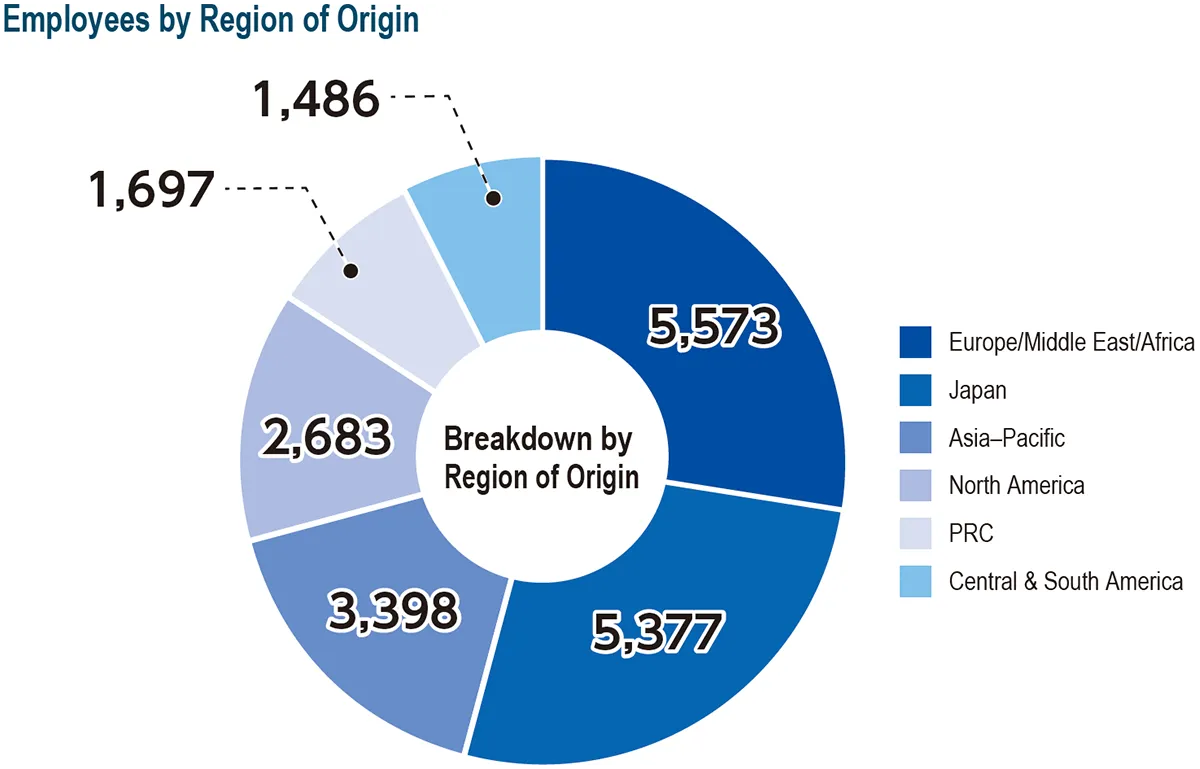
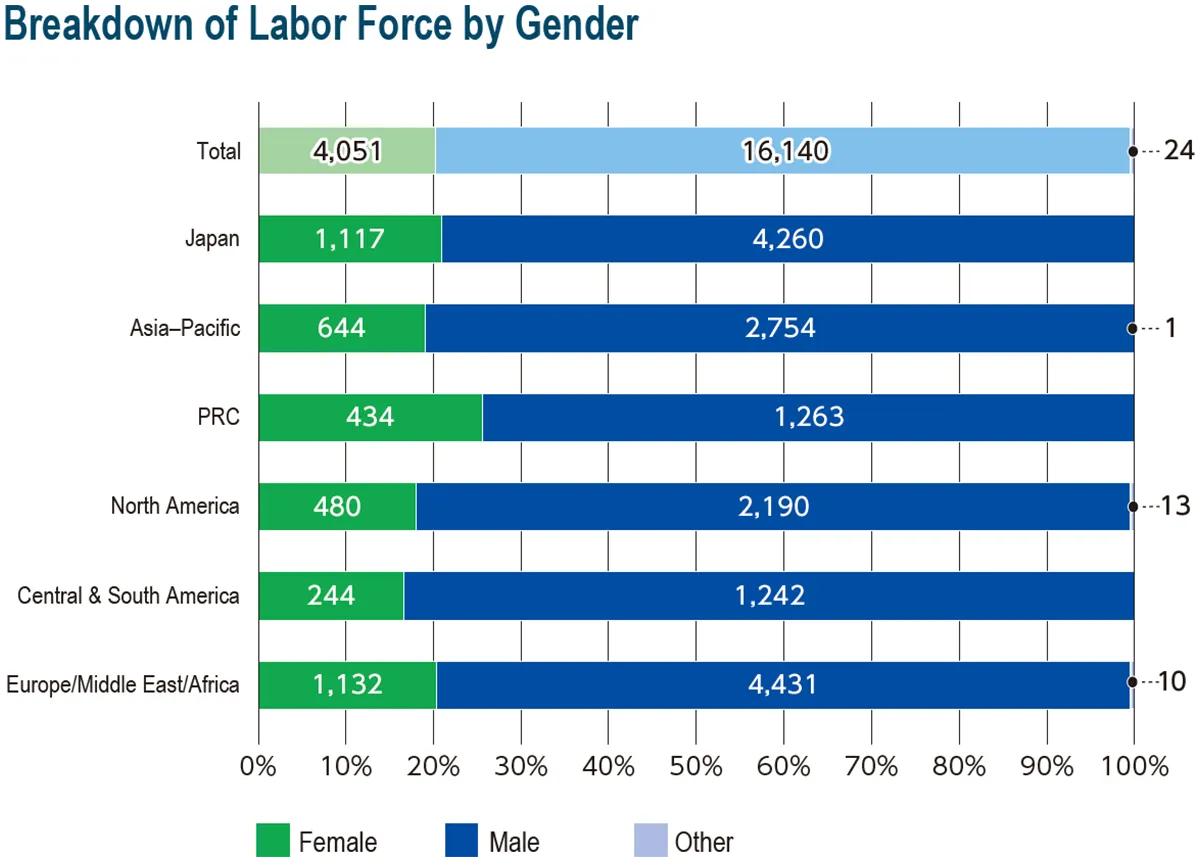
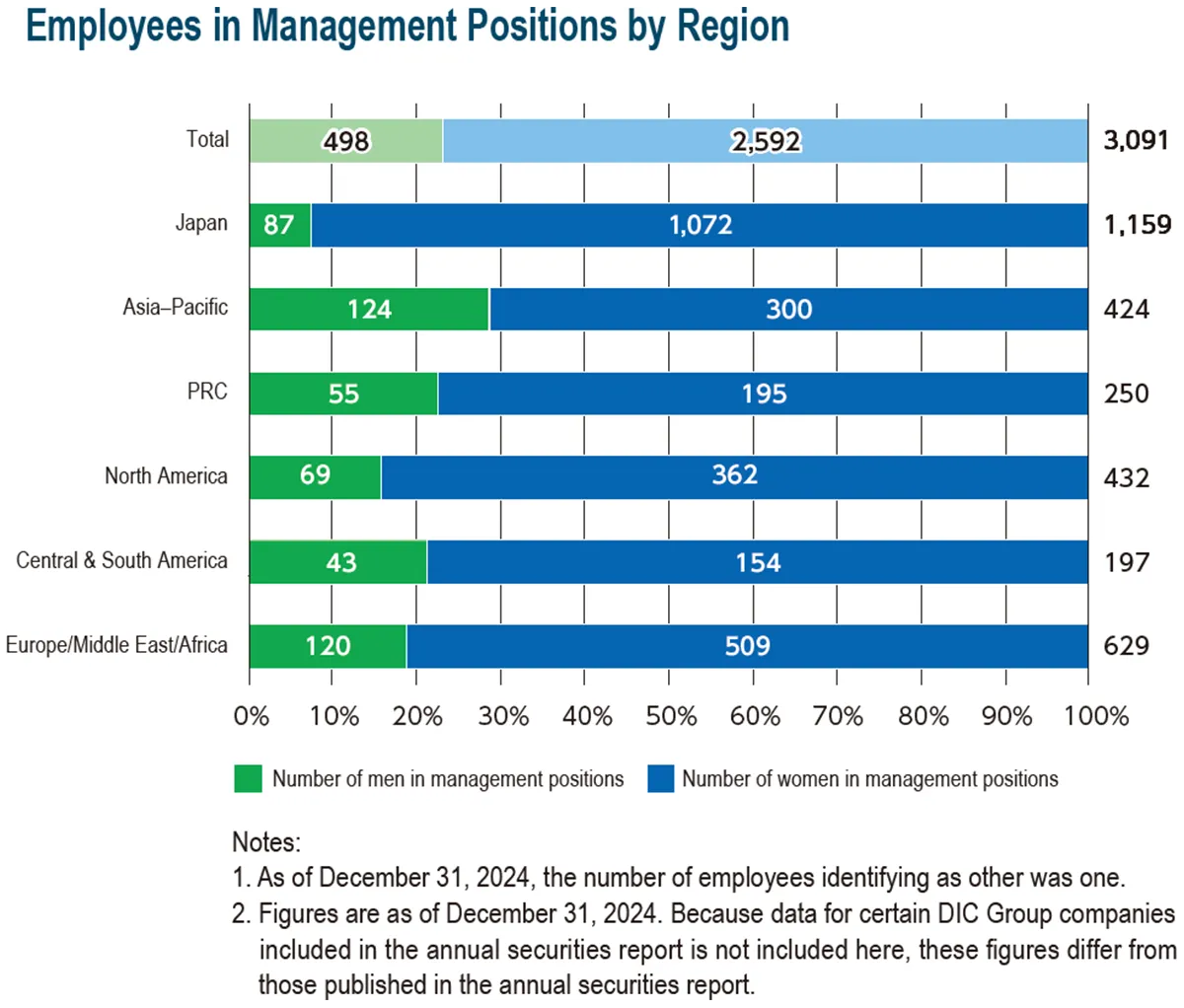
2. Diversity Initiatives by the DIC Group in Japan
The DIC Group in Japan sets quantitative targets for key diversity initiatives. These include targets not only for the diversity of executives and employees but also for key KPIs related to work–life balance such as childcare leave for male employees. Consideration is also being given to the feasibility of publishing information on efforts to advance career opportunities for women, including the setting of gender pay gap targets. DIC has established the targets shown in the table below and its diversity initiatives are progressing steadily, evidenced by the fact that some of those set for fiscal year 2025 have already been achieved. With the aim of disclosing more information on its diversity initiatives, in fiscal year 2024 DIC established a public-facing website, the content of which includes a message from the president and CEO. The DIC Group continues to communicate the importance and necessity of inclusion, as well as promote understanding of such concepts as psychological safety and unconscious bias, which is essential to embracing diversity, and to create a corporate culture that supports well-being by inspiring job satisfaction and a sense of purpose.
Diversity KPIs
| DIC | Targets (Fiscal year 2025) | Achievements | |||
|---|---|---|---|---|---|
| 1 | Percentage of directors and Audit & Supervisory Board members accounted for by women and/or foreign nationals | January 2026 |
20.0% | January 2025 |
21.4% |
| 2 | Percentage of executive officers accounted for by women and/or foreign nationals | 20.0% | 19.0% | ||
| 3 | Percentage of management positions occupied by women | 8.0% | 8.6% | ||
| 4 | Percentage of new employees accounted for by foreign nationals | Fiscal year 2025 |
5.0% | Fiscal year 2024 |
3.9% |
| 5 | Percentage of new recruits accounted for by women | Maintain at 30% | 26.3% | ||
| 6 | Percentage of mid-career hires accounted for by women | 30.0% | 18.3% | ||
| 7 | Percentage of male employees using the Childcare Leave Program | 30.0% | 55.6% | ||
| 8 | Percentage of employees using the Leave to Assist with Parenting Program | 90.0% | 82.1% | ||
| 9 | Percentage of total labor force accounted for by individuals with disabilities | In excess of the legally mandated level |
2.55% | ||
| 10 | Gender pay gap (pay for female employees as a percentage of that for male employees) | Figures are not currentry available. KPIs will be set hereafter. |
|||
| Regular employees (indefinite-term, full-time) | 77.5% | ||||
| Non-regular employees (part-time, fixed-term) | 57.0% | ||||
| All employees | 68.5% | ||||
| DIC | Targets (Fiscal year 2030) | ||
|---|---|---|---|
1 |
Percentage of directors and Audit & Supervisory Board members accounted for by women and/or foreign nationals | January 2031 |
30% |
| Percentage of directors and Audit & Supervisory Board members accounted for by women | 30% | ||
2 |
Percentage of executive officers accounted for by woman and foreign nationals nationals | 30% | |
| Percentage of executive officers accounted for by women |
5% | ||
| 3 | Percentage of management positions occupied by women | 12% | |
| 4 | Percentage of new employees accounted for by foreign nationals | Fiscal year 2030 |
5% |
| 5 | Percentage of new recruits accounted for by women | 30% | |
| 6 | Percentage of mid-career hires accounted for by women | 20% | |
| 7 | Percentage of male employees using the Childcare Leave Program | 100% | |
| 8 | Percentage of total labor force accounted for by individuals with disabilities | In excess of the legally mandated level | |
9 |
Gender pay gap
|
Figures are not currently available. KPIs will be set hereafter. | |
DIC has also set targets for fiscal year 2030, lifting the percentage of directors and Audit & Supervisory Board members accounted for by women and/or foreign nationals to 30%, from the 20% target set for fiscal year 2025. The Company also aims to increase the percentage of executive officers accounted for by women and/or foreign nationals to 30% by fiscal year 2030, from the fiscal year 2025 target of 20%, with 5% to be women.
As of the end of fiscal year 2024, DIC had achieved its fiscal year 2025 and January 2026 targets for boosting the percentage of management positions occupied by women. The Company has set a target for this KPI for fiscal year 2030 of 12% and will continue working to bring this in line with the percentage of its labor force accounted for by women. DIC has also set a target for the percentage of its mid-career hires accounted for by women of 20%. While this is down 10 percentage points from the previous target for fiscal year 2025, it reflects the fact that the majority of mid-career hires are in production, an area in which more men tend to be hired. Results for fiscal year 2025 and January 2026 will be summarized in DIC Report 2026.
① Hiring of Foreign Nationals
With the objective of securing talented individuals with advanced specialized competencies, global perspectives and language proficiency, DIC actively promotes the hiring of international students completing undergraduate or graduate studies at Japanese universities, as well as Japanese and foreign nationals who are completing undergraduate studies at overseas universities or have extensive specialized experience and expertise. At present, 62 foreign nationals are employed in various capacities at the Company. Since fiscal year 2019, DIC has worked actively to support the careers of non-Japanese employees by creating working environments that enable individuals to exercise their capabilities and play an active role. To support these employees’ careers, the Company promotes infrastructural and system improvements, including establishing a consulting desk and dedicated website, translating key in-house materials into English and, in December 2020, introducing biannual networking conferences. In fiscal year 2022, DIC also introduced cross-cultural training sessions for non-Japanese employees and the departments to which they are assigned.
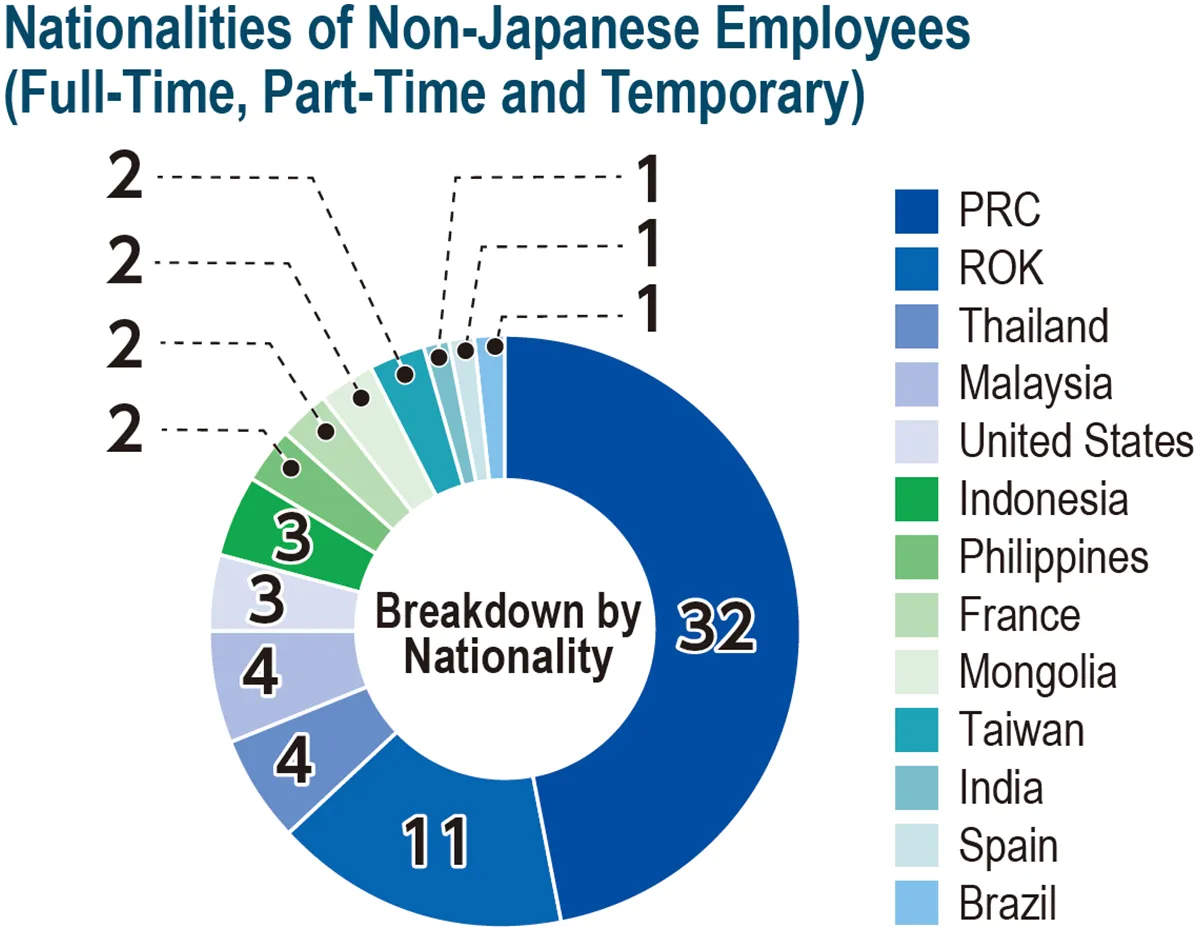
Number of Foreign Nationals Currently Employed at DIC
| Sales positions |
Technical positions |
Department/ division administration |
Posted overseas |
Production | Total |
|---|---|---|---|---|---|
| 4 | 37 | 9 | 15 | 3 | 68 |
VOICE
I look forward to continuing to take on new challenges without fearing change.

I joined DIC in 2013 and was in charge of overseas sales in the LCD sales department for two years. For the next nine years, I was involved in product development, working in the area of LCD technology. At present, my job is in epoxy resin sales in one of the Chemitronics Business Division’s sales groups. In the course of my career, I have had to be flexible to work with people with a variety of different backgrounds and perspectives to realize new ideas and solutions that meet customer needs. For this reason, I feel strongly about the importance of diversity and I also believe that being flexible and adaptable to change is important to succeed in a diverse organization. However, there are still times when companies find it difficult to adapt to the changes that come with an increase in employees who are foreign nationals. I would like to help address this issue by improving workplace awareness and providing support for non-Japanese employees. I want to continue to take on new challenges without fearing change.
Sales Group 1, Chemical Solutions Business Unit, Chemitronics Business Division, DIC Corporation Zhuo Yang
② Expansion of Career Opportunities for Women
DIC is committed to creating work environments and fostering a corporate culture that enables female employees to demonstrate their capabilities. We have established an in-house mentoring program for women in management with in-house executives serving as mentors to help create pipelines to female colleagues in decision-making positions. The Company also continues to provide training, as well as mentoring by female managers, for women about to be promoted to management-level positions.
In fiscal year 2024, DIC focused on initiatives aimed at helping employees balance the demands of their careers and childcare responsibilities and conducted work–life balance support counseling sessions with female managers who themselves have children serving as advisors, as well as surveys and counseling sessions regarding male employees using its Childcare Leave Program. The Company will continue working to foster a corporate culture that ensures no employee has to carry the burden of raising children alone and encourages both female and male employees to play an active role in the family.
● Broadening the Scope of Positions Available to Female Employees
Since first assigning four female employees to line shift jobs at the Chiba Plant in 2008, DIC has gradually increased the number of female employees in production and utility control groups across Japan. At present, there are 26 female employees in such positions at five sites in Japan. The number of women serving as managers and team leaders has also risen. The Company continues to make changes to improve site working environments, including establishing break rooms and locker rooms for women, to further broaden the scope of positions available to female employees.

| Site | Production group | Utility control group |
|---|---|---|
| Chiba Plant | 8 | 1 |
| Saitama Plant | 9 | 0 |
| Sakai Plant | 3 | 1 |
| Hokuriku Plant | 0 | 2 |
| Yokkaichi Plant | 2 | 0 |
| Total | 22 | 4 |
● Initiatives to Expand Career Opportunities for Women
DIC continues to promote a wide range of initiatives to expand career opportunities for women with the aim of becoming an organization in which women can play an active role. With the launch of WSR 2020 in fiscal year 2020, the Company is promoting diversity initiatives that will help increase corporate value.
| Transform corporate culture and mindset |
|
|---|---|
| Encourage the drive and determination of female employees |
|
| Broaden the scope of positions available to female employees |
|
| Establish systems to help female employees balance childcare and their careers |
|
| Create workplaces conducive to job satisfaction |
|
TOPICS
Holding Forum for Male Employees Taking Childcare Leave
DIC is working to encourage male employees to take advantage of its Childcare Leave Program, with the percentage of male employees using this program being one of its diversity KPIs. As part of this effort, in fiscal year 2024 the Company held its first-ever forum for male employees using this program. At the forum, a diverse range of male employees—different jobs, positions, family environments and periods of leave—who have used this program shared their stories, i.e., why they took leave, challenges they faced and creative tactics they devised.
Time was also set aside for a discussion to address participants’ questions and concerns, and to extend concrete advice and solutions. Going forward, the Company plans to post the experiences of male employees taking childcare leave on its intranet to deepen employee understanding, dispel any lingering concerns and encourage even more men to use the Childcare Leave Program.
③ Efforts to Advance the Employment of Individuals with Disabilities
Special-purpose subsidiary* DIC Estate Co., Ltd., spearheads the efforts of the DIC Group in Japan to promote the hiring of individuals with disabilities.
In addition to actively promoting the hiring of individuals with disabilities, DIC Estate works with other DIC Group sites and companies in Japan to review business processes and establish systems designed to expand the range of jobs available and facilitate individual growth, realizing work environments that support employees with disabilities and empower them to realize their potential. DIC Estate also continues to develop systems that encourage growth and create environments conducive to job satisfaction. Thanks to these and other efforts, in fiscal year 2024 the percentage of employees of the DIC Group in Japan accounted for by individuals with disabilities rose to 2.55%, exceeding the mandatory rate of 2.5%. The DIC Group will continue to advance the employment of individuals with disabilities by strengthening Group companies’ recruiting capabilities, as well as by improving systems to bolster retention to enhance the employment experience for employees with disabilities.
- A special-purpose subsidiary is a company that prioritizes the hiring of individuals with disabilities and is authorized by the Minister of Health, Labour and Welfare. DIC Estate was accredited as a specialpurpose subsidiary on January 1, 2023.
VOICE
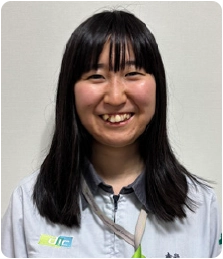
I joined the General Affairs Group at DIC’s Saitama Plant from LITALICO Works, a vocational training and job placement company, in fiscal year 2024. This is my first job as an adult, so I was very anxious at first. Immediately after joining the Company, I was put in charge of maintaining the plant’s tea dispensers, after which I created a manual for tea dispenser maintenance. Now, I also serve as an instructor for new trainees. In addition, thanks to the support of the General Affairs Group, I succeeded in starting up a new in-house delivery service.
I am currently a sub-leader. In this capacity, I am developing a schedule management tool for the team, as well as taking on a variety of administrative tasks. I look forward to working hard to eventually become a leader who can rally the team and is relied on by other team members.
General Affairs Group, Saitama Plant, DIC Corporation Asuka Akaiwa
TOPICS
Introducing DIC, Its Operations and Work Environment
On January 16, 2024, Reina Tahara and Fuka Kaneko of DIC Estate’s Business Support Department gave presentations at their alma mater, Tokyo Metropolitan Shimura Gakuen.* In the class for first-year students, Tahara gave an overview of the company, while in the class for third-year students the two speakers described DIC’s operations and the work environment at the cafe located in DIC’s corporate headquarters. Lively Q&A sessions were also held, enabling students to learn about the practical aspects of their seniors’ jobs and how working adults are expected to comport themselves. Participating teachers praised the event as having been a meaningful opportunity for students.
- Tokyo Metropolitan Shimura Gakuen is a school that has vocational and technical training departments for students with mild intellectual disabilities who intend to seek employment with a company and a department providing education for physically disabled students.
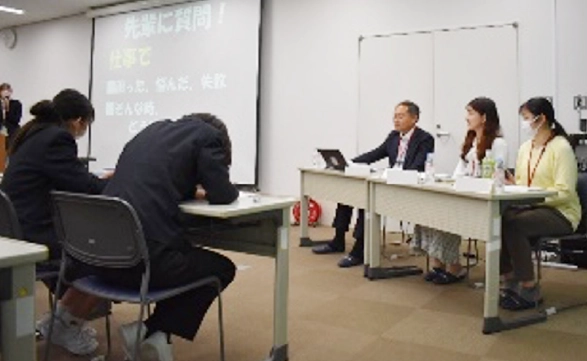
④ Reemployment after Retirement
DIC has deployed a system that facilitates the reemployment until age 65 of individuals reaching retirement age (60) and wishing to remain with the organization. In fiscal year 2024, the Company revised this system, including compensation provided, to create an environment that allows reemployed individuals to maximize their experience and make full use of their accumulated technical skills and specialized expertise, motivating them to continue contributing to sustainable growth for the Company and the training of subsequent generations.
DIC also offers classes for employees in the final year before retirement that helps them prepare for life after they have finished their careers. These classes provide assistance with retirement planning and education regarding pensions, as well as offer retirement lifestyle simulations.
5. Respect for Human Rights
1. The DIC Group Human Rights Policy
The DIC Group actively supports global codes governing human rights and in 2018 formulated the DIC Group Human Rights Policy. In light of the increasing importance of respecting human rights, in fiscal year 2023 the Group announced a revised version of this policy, in line with which it is promoting related initiatives.
The DIC Group Human Rights Policy
2. The DIC Group’s Human Rights Due Diligence System
To fulfill its responsibility to respect human rights, the DIC Group continues to employ, as well as to make systematic improvements, in its human rights due diligence system.

① Addressing Human Rights Due Diligence Challenges in the Area of Procurement
The DIC Group has formulated and disseminates the DIC Group Sustainable Procurement Guidelines and compels its suppliers to respect human rights and to take appropriate steps to ensure acceptable work environments. The Group also surveys the status of suppliers’ efforts through various follow-up procedures. For more information, please see “Human Rights Due Diligence in Supply Chains.”
② Promoting the Responsible Procurement of Minerals
The DIC Group has formulated the Basic Approach to the Responsible Procurement of Minerals, recognizing the high risk of human rights violations in the procurement of these resources. In addition to the surveys described above, the Group also surveys smelters and refineries used for minerals contained in the raw materials it procures. For more information, please see “Human Rights Due Diligence in Supply Chains”
③ Implementation of Human Rights Due Diligence at DIC Group Companies
In fiscal year 2024, the DIC Group promoted human rights awareness at 64 sites belonging to its 13 Group companies in Japan. In tandem with self-inspections for compliance with labor laws, human rights due diligence was conducted with survey items added regarding foreign nationals, who are at high risk of human rights violations in Japan. No issues were identified as a result of this process. Human rights due diligence surveys were also conducted in the PRC and the Asia–Pacific region to ensure a firm grasp of current conditions. Going forward, the Group will continue seeking to raise the level of its human rights due diligence initiative by advancing awareness of human rights, as well as by reexamining and designating businesses with inherent human rights risks.
④ Establishment of Compliance Whistle-Blowing Hotlines and Corrective Measures
The DIC Group has created whistle-blowing hotlines for Group employees. In fiscal year 2024, 23 reports were received regarding human rights– related issues such as power harassment and discrimination. The Group has also established the Ethics Hotline for reports from external stakeholders. The Group conducts internal investigations and responds to any incidents requiring action by taking corrective or remedial measures in accordance with pertinent regulations. For more information, please see “Initiatives to Promote Compliance” in “Compliance.”
⑤ Contact Procedures
Procedures have been established for DIC Group suppliers, customers, local communities and other stakeholders to report human rights–related issues by telephone or via the DIC global website. The Group strives to respond swiftly to queries and complaints received. No such complaints were received in fiscal year 2024.
3. Building Trust with the DIC Employees’ Union
DIC’s management and representatives of its employees’ union meet regularly with the goal of ensuring healthy industrial relations based on mutual trust. DIC shares management information and its vision for the future with union representatives and encourages the frank exchange of opinions. DIC Group union membership by region is as shown below.
Union Membership by Region (Percentage of Eligible Employees)
| Region | Union membership (%) |
|---|---|
| Japan (DIC) | 99% |
| PRC | 100% |
| Asia–Pacific region | 30% |
| Americas and Europe (Sun Chemical) |
54% |
6. Work–Life Balance/Occupational Health
1. Work–Life Balance
DIC views a healthy work–life balance as essential to both self-realization and sustainable corporate growth. Accordingly, from the perspective of corporate health management,* the Company continues to expand systems intended to facilitate such a balance. Against a backdrop of growing global awareness of the concept of “human capital management,” DIC respects the diversity of its labor force and seeks to enable each individual to exercise their capabilities, recognizing its employees as important corporate assets. DIC has promoted initiatives meant to enable all employees to achieve both active and satisfying careers and a fulfilling life outside of work, in line with its belief that positive workplaces lead to higher productivity.
- An approach to employee health management that emphasizes a corporate management perspective and the implementation of strategic measures.
① Balancing the Demands of Career and Childcare
In 1986, DIC implemented a childcare leave program before such programs were legally mandated. Since establishing a program to support employees in balancing the demands of a career and childcare in 2007, the Company has deployed various systems for both regular and management-level employees, including childcare leave and pediatric nursing care leave that exceed legal requirements and a system that allows employees to limit locations to which they will accept a transfer, making it easier for individuals to refuse transfers that involve relocation because of childbirth, childcare, nursing care or other responsibilities.
② Retaining Employees with Nursing Care Responsibilities
In 2016, the Japanese government revised the Child Care and Family Care Law to make it easier for individuals to take leave or time off, as well as increasing benefits for temporary absences from work, for individuals who find themselves with nursing care responsibilities. To promote awareness and encourage use of its related leave programs, DIC has prepared the Childcare and Nursing Care Handbook, which is distributed to DIC Group employees across Japan. The Company has also modified the rules of these programs to make them easier to use. In April 2025, nursing care leave program application and consulting desks were established at DIC and Group companies in Japan to strengthen support for employees balancing work and nursing care.
③ Creating Flexible and Efficient Work Environments
To facilitate flexible work styles, DIC significantly expanded its flextime systems in April 2018 by making it applicable to all areas of operations, with certain exceptions such as production floors. In April 2024, the Company reviewed its core hours and shortened the minimum number of work hours per day to facilitate greater flexibility. This, plus telework, encourages the independent execution of duties and an enhanced capacity for self-management.
④ Introducing a Leave to Accompany Spouse Overseas Program
To ensure its ability to secure and retain talented human resources and enhance employees’ work–life balance, in January 2019 DIC introduced a program allowing employees to take leave to accompany spouses on overseas work assignments. This system helps employees achieve an appropriate work–life balance without having to leave their jobs.
⑤ Establishing a System to Help Employees Balance Medical Treatment and Work
In January 2020, DIC introduced a system to support employees undergoing medical treatment who wish to continue working. To guarantee this system functions effectively, the Company formulated guidelines to ensure employees making use of this system receive the ongoing support necessary to balance medical treatment and work through job-related accommodations and considerations.
⑥ Programs that Help Employees Balance the Demands of Work and Home
| Childcare Leave Program | The maximum length of leave is until the child reaches the age of 2 years and 6 months, which is six months longer than the legally mandated leave period. Male employees can also take childcare leave at the time of birth (postpartum paternity leave) together with four weeks (28 days) of paid leave under the Leave to Assist with Parenting Program during the eight weeks following their child’s birth. |
|---|---|
| Paid leave programs for pregnancy and childcare | Outpatient care leave: Employees can take leave for outpatient care, including regular medical examinations and health guidance. Special maternity protection leave: Female employees can take up to 10 days of special leave during pregnancy or the year after giving birth to protect the health of both mother and child. Leave to Assist with Parenting Program: Male employees can take five consecutive days of paid leave during the eight weeks following their child’s birth to assist with parenting. Pediatric nursing care leave: Employees can take leave to provide nursing care for a child until the end of the child’s third year of elementary school. This includes paid leave of up to five days per fiscal year for one child, 10 days for two children or 15 days for three or more children, all beyond what is mandated by law. |
| Childcare While Working Program | Employees can shorten their workday by up to three hours, stagger their working hours and be excused from doing overtime until the end of a child’s third year of elementary school. Employees can also stagger their working hours to accommodate childcare schedules. |
| Economic support system | This system enables employees on unpaid childcare leave to borrow a portion of their bonuses in advance to pay for, among others, fertility treatment or infant care facility fees. |
| Return to previous (or equivalent) position | Employees returning from childcare leave must be allowed to return to their previous position or to a position equivalent thereto. |
| Information sharing to promote program participation | DIC’s views on support for balancing the demands of work and home, as well as a guide to its various available systems and how to make use of them, are posted on the Company’s websites and intranet. These websites also outline procedures for submitting applications and using the consulting desk for employees facing pregnancy and birth or nursing care responsibilities. |
| Nursing care leave system | Employees can take such leave for up to one year, exceeding the statutory maximum of 93 days. Employees may also break up leave into a maximum of six units. |
| Nursing Care While Working system | Employees not wishing to take leave while providing nursing care can shorten their workday by up to three hours for a maximum period of three years. Employees may also request to be excused from doing overtime without restriction. |
| Leave to accompany spouse overseas | Employees can take leave in the form of a temporary overseas assignment to accompany a spouse who is scheduled to be abroad for more than one year. The period of the leave must be more than one year, with a maximum length of three years. Employees may make use of this system once during their careers. |
| Relocation limitation system | Management-level and regular employees may limit the locations to which they will accept transfers that involve relocating because of childbirth, childcare, nursing care or other responsibilities. |
| System to help employees balance medical treatment and work | Employees undergoing medical treatment who wish to keep working can access necessary support in the form of job-related accommodations and considerations. |
| Half-day and hourly annual paid leave system | Employees may take annual paid leave in half-day units. They may also take up to five days of annual paid leave in one-hour units per fiscal year. |
| Saved paid leave system | Expiring annual paid leave can be saved for up to 30 days and used for a variety of purposes, including injury or illness, nursing care for a family member, care for a sick child, receiving fertility treatment, engaging in volunteer activities or participating in disaster recovery efforts. |
⑦ Use of the Childcare Leave and Leave to Assist with Parenting Programs
Owing to the expansion of various programs to help employees in balancing the demands of work and home, and efforts to encourage the use thereof, the percentage of DIC employees who return to work after taking advantage of the Childcare Leave Program is currently 100%. In addition, the number of employees taking advantage of the Leave to Assist with Parenting Program and postpartum paternity leave following a child’s birth is also rising.
⑧ Reducing Extreme Overwork and Encouraging Employees to Take Annual Paid Leave
DIC has deployed an electronic management system that tracks employee working hours based on sign in/sign out data extracted from IC cards. To prevent extreme overwork, if an employee appears likely to exceed the overtime limit (including weekends) agreed upon by labor and management, or if their monthly overtime has exceeded 70 hours, their supervisor and the senior executive in charge are automatically notified. A report is submitted outlining the employee’s work responsibilities and factors behind the excessive hours, and presenting specific measures to ameliorate the situation, which is shared with the DIC Employees’ Union in a process designed to curb/reduce excessively long working hours. In addition, employees are encouraged to take annual paid leave, with sites recommending appropriate timing for leave and having employees plan dates for such leave.
2. Corporate Health Management
Ties with Employees
The DIC Group continues to promote a variety of initiatives to facilitate active communication with Group employees around the world, including establishing an internal Group chat function, a Group intranet and other new digital channels, thereby enhancing its communications infrastructure.
Communication Across the Global DIC Group
The DIC Group launched The DIC Way Vision and Core Values Awards with the objective of fostering awareness of The DIC Way, which represents the Group’s management philosophy, among employees worldwide. Awards were conferred once again in fiscal year 2024, with gold, silver and bronze award winners selected from among hundreds of nominations received from Group employees recommending outstanding colleagues who embody the Group’s core values. In fiscal year 2025, awards were presented in person at DIC’s anniversary ceremony and a program of presentations by recipients was held, helping further encourage a sense of solidarity and bolster awareness of The DIC Way across the global Group.
In-House Newsletter
The DIC Group publishes a digital newsletter entitled Better Tomorrows, which is compiled and published by teams in Japan, the People’s Republic of China (PRC) and the Asia–Pacific region. Better Tomorrows provides information that assists employees in advancing DIC Vision 2030 and highlights the Group’s technologies, products, businesses, employees and corporate culture, serving as a key tool for improving communication with one another.
Ties with the Media
DIC is reinforcing its publicity activities as a means of communicating with its many stakeholders, including its customers, shareholders, investors and local communities. This reflects its conviction that promoting active disclosure that facilitates objective media coverage is vital to securing stakeholders’ understanding of the DIC Group and its operations, and to promoting a sense of unity among employees. In fiscal year 2024, DIC put out news releases regarding, among others, the implementation of strategies, development and launch of new products, collaboration with other companies, operating results announcements and sustainability initiatives. The Company also disseminated information on its long-term vision, as articulated in DIC Vision 2030, through interviews with members of the media and other means, encouraging understanding of its commitment to deliver value that exceeds the provision of fine chemicals with the goal of contributing to sustainable prosperity.
| Press conferences held in fiscal year 2024 |
Interviews with journalists in fiscal year 2024 |
|---|---|
| 63 | 67 |

